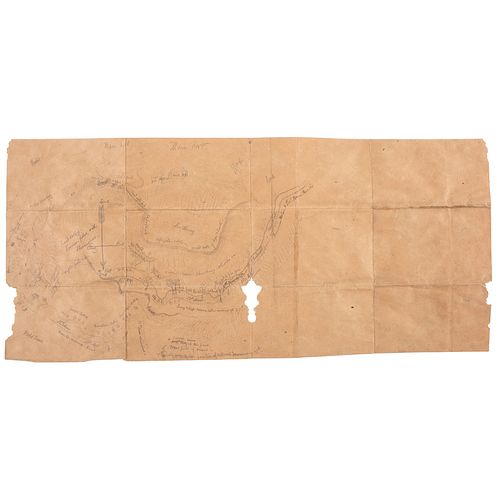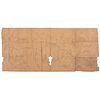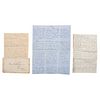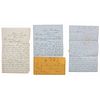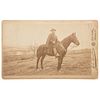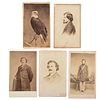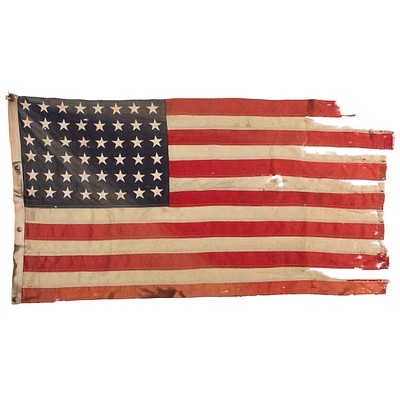Sergeant Edmund C. Whitney, 53rd Massachusetts Archive, 1862-1903
About Seller
6270 Este Ave.
Cincinnati , OH 45232
United States
With offices in Cincinnati, Cleveland and Denver, Cowan’s holds over 40 auctions each year, with annual sales exceeding $16M. We reach buyers around the globe, and take pride in our reputation for integrity, customer service and great results. A full-service house, Cowan’s Auctions specializes in Am...Read more
Two ways to bid:
- Leave a max absentee bid and the platform will bid on your behalf up to your maximum bid during the live auction.
- Bid live during the auction and your bids will be submitted real-time to the auctioneer.
Bid Increments
| Price | Bid Increment |
|---|---|
| $0 | $25 |
| $500 | $50 |
| $1,000 | $100 |
| $2,000 | $250 |
| $5,000 | $500 |
| $10,000 | $1,000 |
| $20,000 | $2,500 |
| $50,000 | $5,000 |
| $100,000 | $10,000 |
About Auction
Jun 26, 2020
Cowan's Auctions is delighted to present the June 26 American Historical Ephemera and Photography Auction, including 55 lots devoted to the African American experience, over 175 lots dating from the Civil War Era, and more than 60 lots documenting life in the American West. Cowan's Auctions dawnie@cowans.com
- Lot Description
Sergeant Edmund C. Whitney, 53rd Massachusetts Archive, 1862-1903
Large collection of war-date correspondence, photography, documents, and more related to the military service and family life of Sergeant Edmund Carter Whitney (1835-1897), 53rd Massachusetts Infantry, spanning from approx. 1862-1903. Highlighted by a remarkably detailed, double-sided, hand-drawn map, approx. 20 x 9 in., showing the positions of Generals Andrews, Banks, Dwight, Moore, and Paine in the Louisiana woodlands, with key strategic notes including the locations of enemy camps, rifle pits, and suspected guerrilla bands. Whitney's time in Louisiana marks the apex of his service record - during the Battle of Port Hudson, he successfully extracted a minié ball from the head of a fellow officer after sustaining serious injuries to his own right arm - and seven of the nine letters offered here are written from various camps in the state, detailing the siege of Port Hudson with gory battle content.
Whitney writes to his mother and various family friends first from Camp Stevens while still in Massachusetts, then en route to and upon his arrival in New Orleans. General Nathaniel Banks had mobilized all troops there and in Baton Rouge to advance on the critical Confederate stronghold of Port Hudson, the capture of which would allow the Union army to regain control of the Mississippi River. The forty-eight day siege resulted in a victory for Union forces, but at the expense of heavy casualties lost both in battle and to disease. Whitney describes the contributing factors of heat and illness around camp, but most importantly documents engagements with the enemy, writing on May 2, 1863: "We have traveled two hundred and fifty miles, one hundred twenty five on foot, have driven the enemy by strategy from our strongly fortified position, by hard blows from another. . . have forced them to destroy five gunboats. . . taken fifteen hundred prisoners [and] some heavy guns, destroyed foundries and great salt works, and have driven to the most perfect rout and demoralization [to] this branch of their army." Later in June, he shares a more somber account: "A general attack was made upon Pt. Hudson, attempting to carry the works by storm. I was on the field from three in the morning till nine in the evening, when we evacuated nearly all the ground we had gained, having met with a perfect repulse. In that time we fought without intermission, actually walking over hundreds of our own dead and wounded, whom we could not remove. . . my own clothes with riddled with shot, and I rec’d a slight wound, and I was one of the very few who entered that field and came safely off again. . . I have seen scores and scores of men with amputated limbs, have heard night and day shrieks such as will cling to me as long as I live, so unspeakably awful were they, and have literally had my hands bathed in the blood of our own dear Union soldiers. Night before last we finished burying our dead, 120 being buried in one grave."
Prior to his military service, Whitney worked as a clerk at the Lancaster Bank in Massachusetts. He remained at home with his wife, Cornelia, until September of 1862, when he finally enlisted as a corporal with Co. I, 53rd Massachusetts Infantry. He was soon detailed to the quartermaster's department and assigned to the ship Montibello, tasked with transporting goods and troops to southern ports. Later, Whitney was ordered to duty in Louisiana, notably participating in the Siege of Port Hudson, where he was wounded. During this time, he served on the staff of Colonel John W. Kimball, acting Brigadier General, and valiantly saved the life of Kimball's orderly in battle, despite his own injuries. He was promoted to the rank of sergeant for his heroism but was plagued by disease for nearly the duration of the war. He continued his career in finance after his recovery, organizing a national bank and serving as its treasurer. He was an active member of his GAR post and Masonic lodge and also worked as chief engineer of the local fire department.
Includes six CDVs, primarily civilian portraits of Whitney credited to D.K. Prescott of Boston, Massachusetts, as well as a striking cabinet card of Colonel Kimball on horseback by J.C. Moulton of Fitchburg, Massachusetts. Also with two widow's pension documents, a string-bound copy of A List of Union Soldiers Buried at Andersonville, The Tribune Association: New York, New York, 1868, printed GAR ephemera, three loose tintypes of unidentified soldiers, assorted family photographs of Whitney's mother and children, two illustrated portraits of Whitney and Cornelia, each framed to 13.5 x 15.5 in., several loose Waterbury Button Co. buttons and other uniform accoutrements, and four books identified to Whitney with titles including The Combatants, General Episcopal Sunday School Union: New York, New York, 1850, inscribed to Whitney and received by him at Camp Stevens in 1862; Solomon and the Prince, and Solomon and the Preacher, T.R. Marvin: Boston, Massachusetts, 1851; The Angel over the Right Shoulder, W.F. Draper and Brother: Andover, Massachusetts, 1853; and an embossed Bible presented to Whitney and Cornelia as an engagement gift. - Shipping Info
-
Buyers are required to pay for all packing, shipping and insurance charges. Overseas duty charges are the responsibility of the successful Bidder. Be aware that for larger and/or valuable items, shipping charges can be substantial. - If there is no shipping amount on listed your invoice, you will need to make arrangements to pick up or ship your purchase through an alternative shipping company. Our shipping department can be contacted at 513.871.1670 (ext. 219) or email shipping@cowans.com. - Shipping charges include insurance for your order while in transit. If you have private insurance we will adjust your charge to include only packing and shipping. - Please allow 14 – 21 days after payment to package and ship your purchase as carefully as possible.
-
- Buyer's Premium



 EUR
EUR CAD
CAD AUD
AUD GBP
GBP MXN
MXN HKD
HKD CNY
CNY MYR
MYR SEK
SEK SGD
SGD CHF
CHF THB
THB